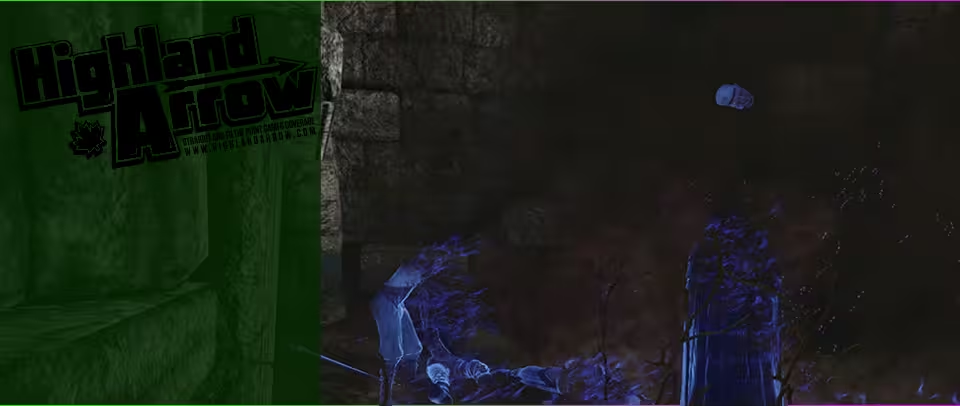


Lichdom: Battlemage
Platforms: PC
Reviewed on: PC
Reviewer: Maiyannah Bishop
Review Play-Time: 13h
Developer: Xaviant Games
Publisher: Xaviant Games
Released: 2021-05-21
Review Published: 2014-12-23
Review Updated: 2021-12-21
+ High graphical fidelity
+ Strong visual effects
+ Great shooting mechanics
+ Some interesting boss fights
+ Deep spell-crafting system
- High amount of obscurement with the visual effects
- Getting items for the crafting system becomes a
grind-fest very rapidly, and is based on RNG
- Story is fairly weak and very stereotypical
- Many boss fights simply become arena fights with
lesser enemies, and not very well-designed ones

Editor's Note: Maiyannah's copy of this game was provided free of charge by a reader.
Lichdom: Battlemage is a fantasy-based first-person shooter developed and published by Xaviant Games somewhat in the vein of the old Hexen or Heretic games. I've heard it called an RPG, but it really isn't: there's not much roleplaying, there's no character creation beyond choosing the gender of your character, the dialogue is entirely linear, and there's no character progression. Rather, it's something of a fantasy shooter, where you are a mage crafting your own spells. Indeed, it's that crafting aspect where the game hangs its proverbial hat, to mixed results.
Battlemage looks bloody gorgeous for the most part
Powered by CryEngine, the visuals that Lichdom: Battlemage gives you look brilliant, and had no real frame-rate hit even on the higher end that I noticed. One of the things I noticed most in that respect is that it kept a very adequete frame-rate on my only mid-end rig even when things got busy, dropping to 50 at the lowest, all while looking really just gorgeous. Probably the thing that I appreciated most, given my well-documented hatred for over-use of visual effects that make the game seem cluttered, is that Lichdom reserves most of that for making the spells look shiny; the locations themselves are simply good looking without a bunch of ridiculous "moist" stuff being applied and the like.
There's plenty of graphical options in the game to adjust to your preferences and to the strength of your rig, so that is a big plus as well. The only real complaint I have here is that while there's a FOV slider (something that TotalBiscuit and other sufferers of simulation sickness were no doubt happy for), it's not really labelled well ... or at all, so what setting is what specifically is mostly guess-work, though you can of course set a specific setting in ye old game configuration files. That's not really an excuse to not have the game options properly-labelled however, but I'm inclined to be charitable beyond that, given the game's pretty much replete with options.
The pacing of the game is fairly mediocre
The largest problem I had with Lichdom: Battlemage was the pacing, really. Many games commit the sin of pulling you out of the action frequently, and Lichdom: Battlemage does it in a big way. It's obstenisbly an arena shooter, and the filler between arenas is either exposition or small trails of "pustules" to pop for spell-crafting pieces and fighting the occasional enemy. The latter was fine, especially when the game felt like it started getting a real feeling of exploration of some of the places going, which lets it show off it's marvellous scenery. The former however, ended up not being so.
Part of the problem is the fact that every time the game developers feel you're not getting the obligatory amount of action they will contrive a reason to teleport you to some other place. And contrive really does become the word later on into the plot, where the archmage that empowered the protagonist will basically chuck you anywhere. There's no real feeling of cohesion to the game and you never really get to observe many of your surroundings. It's all just a backdrop that you're shepherded through, which honestly makes little use of one of the game's strongest aspects. I'm sure some art designer spent a great deal of time lovingly crafting that arena I just blew threw in like a minute and then never looked at again, and the game is just rife of mis-spent effort in that regard: fine details over areas we never really get to appreciate.
Of course, that's ancillary to the main problem that causes: such stilted-ness really ruins the tempo of an already stereotypical plot.
Dragon's story is nothing to write home about
The story puts you in the boots of a male or female protagonist of your choosing, though that's all the customisation you get, whom the game refers to after the prelude simply as Dragon. I chose the female one myself and was presented with a very test introductory cut-scene where some big bad does big bad things to your family and you're left to chase after him. An archmage fellow finds you and basically gives you the gift of magic, and then you're promptly set off to go kill the big bad. If that sounds a bit vague and lacking in detail it's because I could already feel my eyes glazing over as archetypical game plot number five-seventy-one played out before me, without even much deviation from the typical tropes.
I've said it a few times before, and I'll say it again here: the problem this and many similar plots has is that you are never given any time to relate to any of the characters to which you might be said to be supposed to. I can't relate to wanting revenge for the murder of someone I've known for approximately ten seconds out of a cut-scene, for instance, which is the case here. This is why Half-Life 1 opened with you making banal conversation with passing scientists as you liesurely follow the strangely-linear corridor to the ultimate initial conflict, after all.
The game actually develops something of a bad habit of that, expecting you to feel loss for a friendly guy who helps you through maybe an hour of the game, or to feel that some passing guy who may as well be wearing "Im the next boss fight" on a sandwich board presents some long-term rival. There's something very transitory about the story to Lichdom: Battlemage, and much like the arenas they feel very much like something there out of obligation to be set dressing.
Shooting and combat is fairly fun and well done but quite repetitive
The meat of the game on offer when it comes to Lichdom, beyond that veneer of the shiny visuals, is definitely the shooting, which I would describe as serviceable and decently-engaging but not particularly innovative or excellent, but rather merely competent. While the combat is fairly fast-paced, a usually arena-based affair, with plenty of enemies and intelligent AI to challenge you, the number of actual enemy types presented are fairly low: you get merely different variations on "melee guy", "ranged guy", and "magic guy" and there isn't much non-visual difference to them as you progress, save for a handful of special enemy types, other than them hitting harder.
That's not to say the arena-shooting isn't fun: the game has plenty of balls to absolutely dump a ton of enemies into those arena Serious Sam or Painkiller style and usually does a good job of making the fights just hard enough to feel challenging without being overly difficult. Given you only really have a handful of weapons available though, since you only get three attacks essentially, unless you start swapping rapidly between elements, which I found to be a hassle, you can quickly find yourself falling into a repetitive routine; this gets exacerbated later on as you start encountering enemy types which are weak against certain elements, necessitating you focussing specifically on that element and ergo kneecaping the number of tools available to you. Dual weapon systems are quite trendy in first-person shooters of late, but they are never to the game's design benefit, they merely save programmers control issues on consoles. Given that this game was developed for PC however, it has no such excuse, and indeed, it suffers from a lack of variety in its shooting in any given encounter as a result.
The larger problem for many shooter fans will be the lack of impact to many of the skills. There's a few varieties in the crafting system that will give a real feeling of "oomph" to them, but most of the various combinations will merely plink plink plink away at increasingly-bullet-spongey enemies without much feeling of weight and impact. For a game that sells itself as putting you in the shoes of a bad-ass spell-caster, I was expecting to have abilities that would just take the weaker enemies apart, spectacle fighter. Instead it plays like a less shit version of Borderlands. And while some may argue that being like Borderlands but not shit might be enough, but personally, I was left quite disappointed. I still had some fun, don't get me wrong, but there's definitely a point a few hours in where the shooting feels more like a chore than it does feel like being some awesome mage.
Crafting is where the game comes out of its shell,
but even that system isn't neccesarialy too complex
So the spell-crafting system isn't actually advertised as much as some of the other elements of the game, but it's definitely where the heart of this game is, and the meat on its proverbial bones. It's less complex than it originally looks to most at first, but it manages enough depth and complexity to keep things interesting at least for the first while. Essentially you combine a delivery method (say "ball", "aoe blast", etc), and various effects to create spells using the little dealies for the various effects you get as pick-ups, and with that, you can make some pretty impressive spells.
Part of the problem this can present to the game is that what pick-ups you get are random, so there's the possibility that you could have a bad roll with this. While the game developers have thought of this to some degree obviously, since things like bosses seem to have guaranteed drops, it can still be a problem since the rest of it is procedurally-generated, and the boss item stuff ends up being a baseline rather than making truly powerful, epic spells. I ran into it myself where about 10 hours into the game I was distinctly and self-evidently below the power level I was expected to have, since I estimate the enemies to have taken approximately five million shots to kill.
The other thing here is the shooting experience you have will depend upon what spells you create as well. As I mentioned before, some of them have some real oomph and flair to them. Others are akin to the gentle summer's breeze across the soft cheek of a smiling newborn babe - which is to say, they most decidedly do not have any oomph to them, irrespective of how much damage they are doing. Since the action is so frenetic with the number of enemies that get dropped on you, you might not notice it too much, but those accustomed to the kind of solid shooting you get out of iD or People Can Fly are going to be distinctly disappointed. A quibble I ran into with my particular setup of spells was that every battle became a protracted game of shoot and kite, shoot and kite, since I was using primarily bolt attacks magic-missile style. There's area of affect spells and nova-type stuff, but I never got a strong enough spell of that variety going to really consider that a viable option. So kiting it is. And that's again where that aforementioned random drop nature can get you.


